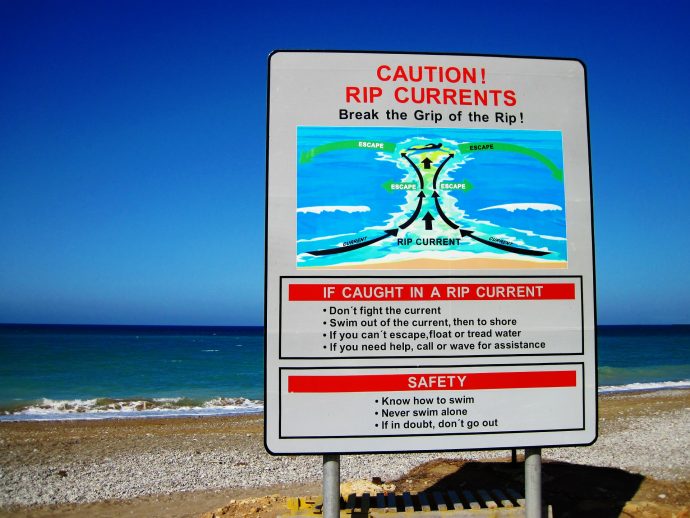Myrtle Beach and North Myrtle Beach are safe and fun destinations for vacationers looking to enjoy some sand, sun and waves. While the beaches are kept safe by lifeguards and very few incidents occur in either location, one of the things many vacationers worry about while enjoying the ocean are riptides. Riptides are strong currents caused by tidal flow in confined areas such as inlets and presenting a hazard to swimmers and boaters. If you are caught in a riptide, these tips can help you escape it safely.

Stay Calm
If you find yourself caught in a riptide, the most important thing you can do is stay calm. If you get scared or panic, you are more likely to swallow water and will not have the mindset needed to escape it. A riptide will not pull you under the water, it will only pull you away from the shore. Wave your hands and yell for help to get the attention of a lifeguard who can swim out and help you get back to the beach.
Avoid Them
Of course nobody plans on being caught in a riptide, but many people don’t realize that there are ways to avoid them. Before you venture out into the ocean, take several minutes to watch the waves and water. If you notice that the waves are crashing on the shore perpendicular instead of at an angle, a riptide could occur. You should also watch for water that is discolored near the shore, gaps between waves or calm areas in an otherwise choppy ocean. Riptides are also more likely to occur near sandbars, piers and anything else that sticks out from the beach that could catch a longshore current and cause it to start flowing away from shore. North Myrtle Beach and Myrtle Beach both offer riptide warnings so check the local weather channel or ask a lifeguard if there is a high risk for riptides before you go into the ocean.
Do Not Fight The Current
Your first instinct will be to swim back towards the shore. Fighting the current will only make you tired and could cause you to drown. Most riptide deaths are caused by exhaustion and drowning due to the swimmer fighting the current. Focus on staying afloat until you are rescued or swim parallel to the shore to get out of the current. Once you are no longer caught in the riptide or being pulled away from the shore, you can turn and swim back to the beach.
Being caught in a riptide can be a scary experience, but is also an unlikely one. If you do find yourself caught in a riptide, remember these tips to help you escape it safely.

 Area Info
Area Info  Attractions
Attractions 